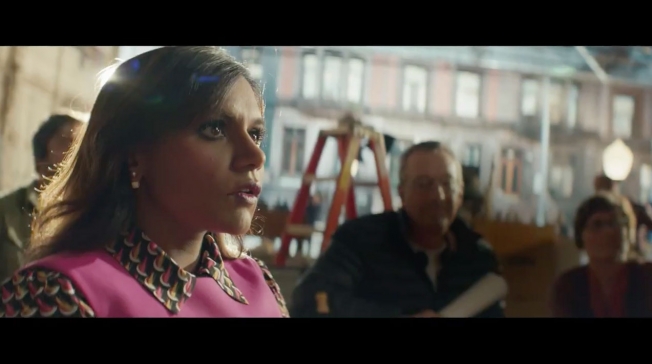
American Express tells four heartfelt stories of celebrity struggle, and ultimate success, in these spots from Oglivy & Mather. The ads—featuring queen of soul Aretha Franklin, sitcom star Mindy Kaling, GoPro founder Nick Woodman and restauranteur Natalie Young—aired in edited form during Sunday's Academy Awards on ABC.
The stars, all AmEx customers, recall how they battled adversity. Franklin vanquished youthful shyness and insecurity to become a dynamic stage performer. Kaling overcame typecasting, refusing to play second-banana roles—"best friends" and such—as she climbed the ladder in Hollywood. Woodman reinvented himself from scratch, even moving in with his parents, after his first business failed and he lost $4 million of investors' money.
Young's tale of addiction is the most intense. "Everything that was good, was gone," she says in a sobering voiceover. "I lost my family. I lost friends, lovers, jobs. … I took any job I could get. I trimmed trees. I washed cars. I just felt like a number. I didn't feel like I was important, and that I was irreplaceable. And they made sure I knew that, that I felt like that. I know, today, that I don't want anybody that works with me to feel that way."
At the end of each spot, AmEx tries to forge a connection between endorsers, viewers and the company's offerings. For example, during Young's story, text flashes on screen: "To the next generation of late bloomers, welcome." Kaling's ad mentions "the next generation of unlikely leading ladies." Ultimately, AmEx reminds us that "The journey never stops," positioning its products and services as helpful tools to have along the way.
"People think we're just a brand of when you quote, unquote 'arrive,' " Marie Devlin, AmEx's svp of global advertising, tells The Wall Street Journal. "We very much want to be with people along their journey through life. It's not about a final destination."
That strategy is fairly well implemented here. The spots look great, and the storytelling is first rate. It's compelling, inspirational stuff, perhaps even refreshing and unexpected for the brand and the category.
Still, there's a disconnect. There's no evidence, nor even a suggestion, that AmEx helped them achieve stardom—or anything, actually, so the value proposition remains elusive. OK, they carry AmEx cards in their wallets. With all due respect: So what? (At least the campaign's main social component—asking users to tweet in return for AmEx's financial support of a documentary about ballerina Misty Copeland—displays some cause and effect.)
The whole initiative would be stronger if it focused on famous folks who scored major life victories precisely because, at pivotal points in their development, they used AmEx, and the company's services pulled them through. That would give the campaign an extra layer of integrity, and perhaps deter those who would point out that charge cards—often misused in times of desperation—can bring people's journeys to a crashing halt.